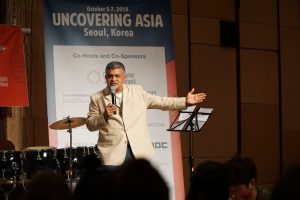The gadfly political cartoonist Zunar is again facing a police probe in Malaysia over a satirical drawing that mocked a senior official, he said this week, a few days after a performance artist was arrested for insulting the country’s queen. In a statement to the press, Zunar (real name Zulkiflee Anwar Ul Haque) said that police in the northern state of Kedah had summoned him to appear on May 2.
The complaint was brought against Zunar on January 25 by an ally of Muhammad Sanusi Md Nor, the state minister of Kedah, after Zunar published a cartoon criticizing the minister’s decision to cancel this year’s celebration of Thaipusam, a Hindu religious festival that the Tamil community normally observes on January 28.
Zunar’s offending cartoon shows the Kedah state minister slamming a cleaver bearing the words “No Thaipusam” down on a table around which representatives of Malaysia’s various ethnic groups had been seated. The accompanying caption says: “Kedah’s inhabitants lived in peace until he came.”
The complaint accuses Zunar of violating Malaysia’s much-criticized sedition law, which penalizes “a tendency to bring into hatred or contempt or to excite disaffection against any ruler or against any government.” The law carries a sentence of up to three years imprisonment.
Sworn in as the chief minister of Kedah in May 2020, Mohammad belongs to Parti Islam SeMalaysia (PAS), the country’s largest Islamist party, which also controls state administrations in Kelantan and Terengganu. In each of these three states, the party has pledged to introduce Islamic hudud law, and has been accused of marginalizing non-Malay and non-Islamic segments of society. The Kedah state authorities claim that the Thaipusam festival was canceled due to COVID-19.
This is not the first time that Zunar has had run-ins with the authorities for his pointed caricatures of senior politicians and other powerful figures, very often accompanied by serrated Anglo-Malay puns. He was particularly active during the 2009-2018 tenure of Prime Minister Najib Razak, taking aim at his alleged embroilment in the gargantuan 1MDB corruption scandal and his wife Rosmah Mansor’s notorious penchant for high-end jewelry and Hermès Berkin handbags.
The constant salvos against Najib and his allies led police to raid Zunar’s office and confiscate whole print-runs of his books, while his gallery showings were broken up by the authorities. “Laughter is the best protest,” Zunar told me when I interviewed him in Kuala Lumpur in October 2017. “I always say, if you can’t beat them, laugh at them.”
The latest moves against Zunar came a few days after April 23 arrest of the political artist Fahmi Reza for posting an online music playlist poking fun of Queen Tunku Azizah Aminah Maimunah Iskandariah.
The playlist, which is still available on Spotify, comprises songs containing the word “jealous” or “jealousy” in the title. This was a reference to the queen’s recent social media riposte to people who had questioned the royal family’s preferential access to COVID-19 vaccines: “are you jealous?” After 99 songs on the jealousy theme, the playlist then comes to an end with the Sex Pistols’ “God Save the Queen.” Local authorities say that Fahmi is being investigated under Malaysia‘s sedition and communications laws.
Yesterday, Fahmi announced that he was being investigated for sedition over two additional satirical artworks, including one depicting Health Minister Dr. Adham Baba dressed as Dracula. Like Zunar, this is not the first time that the artist has courted friction with the powers-that-be. In 2018, he was sentenced to jail in Malaysia for portraying then Prime Minister Najib as a clown, though his sentence was later commuted.
These two cases have highlighted the deteriorating state of free speech under the government of Prime Minister Muhyiddin Yassin, who came to power in March 2020 after helping precipitate the collapse of the previous ruling coalition. Initially clinging on to power with a wafer-thin parliamentary majority, critics say Muhyiddin has since used the coronavirus pandemic as a pretext to arm himself with emergency powers, silence dissenting voices, and strengthen his hold on power.
Parliament is currently suspended under a state of emergency declared in January to deal with the COVID-19 pandemic. In March, Muhyiddin’s government adopted a so-called “anti-fake news” ordnance that made it an offense to publish or reproduce any “wholly or partly false” information related to COVID-19 or the state of emergency announced in January to combat the pandemic.
In its most recent World Press Freedom Index, released by the watchdog group Reporters Without Borders (RSF) last week, Malaysia fell 18 spots, the steepest decline of any Southeast Asian nation. In the words of RSF, Malaysia’s current government “embodies the desire for absolute control over information.”
With COVID-19 once again on the rise in Malaysia, despite the state of emergency declared in January, the relatively liberal climate of the last, reformist administration now seems like a distant memory.

































